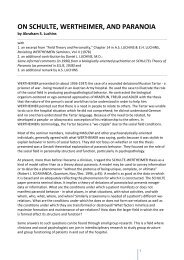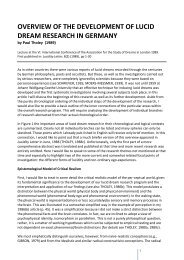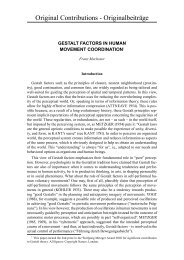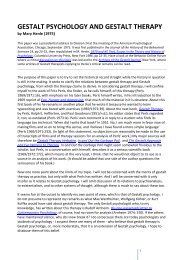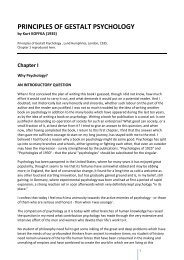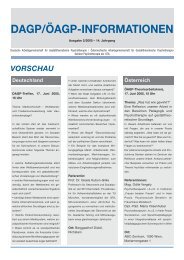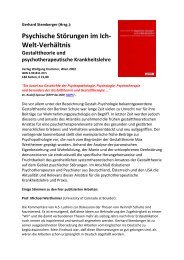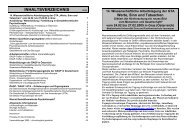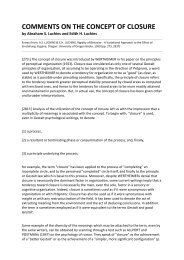pdf-Download - Society for Gestalt Theory and its Applications (GTA)
pdf-Download - Society for Gestalt Theory and its Applications (GTA)
pdf-Download - Society for Gestalt Theory and its Applications (GTA)
You also want an ePaper? Increase the reach of your titles
YUMPU automatically turns print PDFs into web optimized ePapers that Google loves.
"Wesenseigenschaften" (physiognomic or expression characteristics of a <strong>Gestalt</strong> as a whole), as distinguished from<br />
material characteristics <strong>and</strong> structural characteristics.] And that's what it was like <strong>for</strong> Fritz PERLS as well. He<br />
realized the significance the <strong>Gestalt</strong> theoretical approach gains <strong>for</strong> people, <strong>for</strong> the individual as<br />
well as <strong>for</strong> the community, provided it is systematically translated into practical therapeutic action.<br />
Who among the <strong>Gestalt</strong> theoreticians, apart from Kurt LEWIN after his emigration, has engaged<br />
with the confusing diversity of immediate human relationships?"<br />
Theo: "Surely, there have been other approaches: the old paper by SCHULTE (1924) titled 'An<br />
Attempt at a <strong>Theory</strong> of the Paranoid Idea of Reference <strong>and</strong> Delusion Formation'; LUCHINS (e.g.<br />
1949, 1964) <strong>and</strong> FROMM-OPPENHEIMER (e.g., 1968) studied clinical psychology in the United<br />
States, almost simultaneously with PERLS; ARNHEIM engaged in critical analysis of the arts <strong>and</strong> the<br />
film medium (cf., e.g., 1978); <strong>and</strong> there are a number of philosophical, almost psychotherapeutic<br />
<strong>and</strong> political publications by Max WERTHEIMER in the United States (1934, 1935, 1937, 1940)..."<br />
Fritz: "... which no German <strong>Gestalt</strong> theoretician has found relevant enough to be translated, not<br />
even Wolfgang METZGER who has after all translated Productive Thinking (WERTHEIMER, 1964)<br />
<strong>and</strong> whose profound agreement with his teacher WERTHEIMER is supported by his important<br />
book Creative Freedom (Schöpferische Freiheit, 1962). You could actually talk to METZGER about<br />
<strong>Gestalt</strong> therapy without him immediately turning up his nose. But apart from that, most German<br />
<strong>Gestalt</strong> theoreticians disowned their own fathers after the war unless papers fitted tolerably into<br />
the paradigm of experimental statistophilia, to coin a new term. And even in the United States<br />
neither WERTHEIMER nor LUCHINS achieved any acclaim or influence with the above mentioned<br />
treatises. [It would indeed be interesting to draw a comparison between Mary HENLE's views about the position of<br />
<strong>Gestalt</strong> theory (1978) <strong>and</strong> the propositions of Michael WERTHEIMER, Max WERTHEIMER's son, about his father's<br />
underst<strong>and</strong>ing of the <strong>Gestalt</strong> approach (1980, also contained in Max WERTHEIMER, 1991)]<br />
Of course I'll readily concede that PERLS wasn t the incarnation of <strong>Gestalt</strong> theory pure <strong>and</strong> simple<br />
(who is?), but he has impressed so many people in his concrete work with them that they have<br />
spread - <strong>and</strong> who could be surprised at it? - even his theoretical inconsistencies <strong>and</strong> have on top of<br />
that, according to the principles of the development of rumours, distorted whatever was indeed<br />
acceptable. These people shouldn't have been deserted. Mary HENLE's public discussion of PERLS<br />
in 1978, demonstrating remarkable passion <strong>and</strong> the obviously irrevocable intention of tearing him<br />
to pieces, came at least 20 years too late. Was LEWIN's fate any different in respect of the delay of<br />
discussion? No! And this has resulted in the fact that many representatives of group dynamics<br />
refer to him even though they have at best read his last programmatical papers, but have no idea<br />
about his <strong>Gestalt</strong> theoretical background (Jörg FENGLER, personal message to Jürgen STEINKOPFF<br />
of the 2nd of December 1977), which in turn has inflationary tendencies when it comes to theory<br />
<strong>and</strong> practice in this field. The group dynamics research of LEWIN hardly existed <strong>for</strong> academic<br />
<strong>Gestalt</strong> theoreticians. And this split too had already started in the United States."<br />
Theo: "You've mentioned METZGER. He had reviewed the American LEWIN rather early on (cf.<br />
1963, 1975). And very positively. And don't <strong>for</strong>get also many of those here present." -<br />
"Right, let me interrupt you two once more. I'm finding all this reasonably interesting, but in<br />
regard to the topic I gave to you it seems a bit like talking about the world <strong>and</strong> his wife.<br />
But your conversation has made me realise one important thing: It seems to me that <strong>Gestalt</strong><br />
theoreticians of all orientations are to blame to some extent <strong>for</strong> the dissociated development of<br />
their own approach. After the dispersion of the <strong>for</strong>mer centres of <strong>Gestalt</strong> theory by the racist civil<br />
service legislation of the Nazis, too many theoreticians considered their own pile of muck to be the<br />
best <strong>and</strong> preferred to 'leave the field' when a realisation of the (lip) service to the whole <strong>and</strong> the<br />
3



